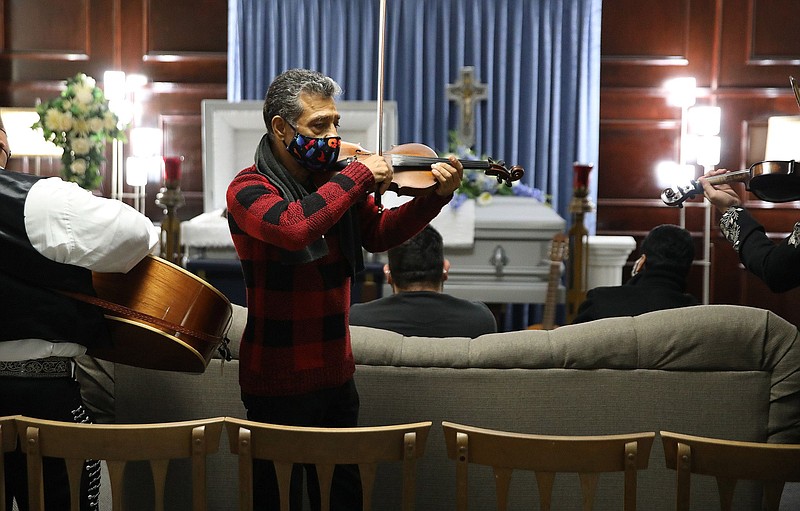CHICAGO For decades, Florentino Chavez played the guitar in different mariachi bands in the Chicago area, cheering up thousands during celebrations and comforting many more following a heartbreak or a loss.
On Dec. 4, fellow members of the group Mariachi Mexico Vivo played and sang his favorite song one last time.
This time, they comforted each other and his family as they sang farewell to Chavez, whose body lay in a casket dressed in a black mariachi suit with his sombrero by his side.
He died suddenly from a stroke, making him the 10th compaero Enrique Leon has had to sing goodbye to in 2020.
The ritual of having the mariachi community come together to play at the funeral or wake of a musician who has died has become a common practice, and it is a sign of respect and camaraderie, said Leon, leader of Mariachi Mexico Vivo.
More than six of his fellow musicians have died of COVID-19 complications, and the rest, like Chavez, had other health problems, he added.
"It's been a sad year, to say the least," said Leon, who said mariachi has helped keep him and many other families strong. In past years, he said, one or two fellow musicians would die, "never so many" as in 2020.
Nearly 30 musicians from the Chicago area, some who knew Chavez well and others just acquaintances, showed up to pay their respects at his wake and services, all while following COVID-19 safety guidelines.
"We like to listen to mariachi when we're happy, but we also listen to it when we're hurting because it helps to comfort us," he said.
At some funeral services and wakes before the pandemic, up to 100 musicians from different mariachi groups would attend from all over Chicago and surrounding areas to sing for a fellow mariachi.
"It is the craft that unites us because we shared the same passion. We like to say that we belong to 'the mariachi guild,' regardless of what instrument we play, where, or how old we are; we sing when we're happy and when we're hurting," Leon said.
Librado Romero, one of the mariachi guests, views Chavez as one of the pioneers of the mariachi scene in Chicago, and though he only knew him for a short period of time, said that "we owe him respect for opening the door and connecting so many of us."
Chavez, who was 76 moved to the United States from Jalisco, Mexico, nearly four decades ago and was never able to return.
But he brought his love for music, specifically the guitar, with him, Leon said.
Leon said Chavez was one of his first friends after Leon arrived in Pilsen 20 years ago. They were neighbors.
He introduced him to other people in Chicago in the music industry, and if a mariachi ensemble was missing a guitar player for a gig, he would connect them to Leon. Sometimes they played together at restaurants or bars, charging around $30 per song.
"That's how the whole mariachi community is. We help each other because there aren't many of us," he said.
Leon said the mariachi community represented at the wake communicates through a Facebook group that has 130-150 members.
In a video message, Arturo Gallegos sang a song for Chavez while he played the accordion. He said he couldn't attend the funeral because of concerns about COVID-19, but said he appreciated "Tino," as friends called him.
"We're like a big family," Romero said.
Although the origin of the mariachi ensemble goes back hundreds of years, it is popularly known the modern band originated in Jalisco, Mexico, and began to expand after the 1930s.
Now, a mariachi group includes people who play violins, trumpets, a guitar, a round-backed guitar called the vihuela, a deep-noted guitar called the guitarron, which serves as the bass for the ensemble, and a Mexican folk harp.
Leon plays the guitar and the guitarron. He began Mexico Vivo, in 2005 and in 2018, formally invited Chavez to be a part of it.
"He was a good and happy man," Leon said about Chavez.
Despite being surrounded by music, he lived a lonely life. Most of his family lived in Mexico and over the years he became distant from them.
When Leon learned of Chavez's sudden death on Nov. 29 after getting a call from the owner of the property where Chavez lived, he had to find his family to let them know.
Leon said he had spoken to Chavez just the day before.
"I asked him how he was feeling and he sounded cheerful, as always" Leon said. There were no gigs in place and since the newest COVID-19 restrictions, they weren't going out to play at restaurants, so he called to just check in.
"I was not ready to get that phone call later that night," he said.
Leon was able to connect with some of Chavez's children in Mexico and nephews in the Chicago area, who all came together to help plan and pay for the funeral services, said Jesus Rodriguez, a great-nephew of Chavez.
Rodriguez said the family was grateful for the gesture from the mariachis: "It was beautiful."
"Though my uncle was a loner, he was still loved," Rodriguez said.
His remains were taken back to Jalisco, known as La Tierra del mariachi, or the land of the mariachi, where he played the guitar for the first time.

